Space Lion is a simultaneous action selection game, like Pocket Paragons, but on a much grander scale. Five players clashing over multiple battlefields at the same time, carefully managing your units so they won’t become expended at the wrong time. When we decided to do a crossover between Space Lion and Pocket Paragons, it was a fun design challenge taking that big battle feeling and condensing the creative gameplay experience of an entire army down into just one unit.
The Space Lion Pocket Paragons box introduces a new mechanic called Seal, which essentially double-exhausts a card. A sealed card is exhausted, like a normal card, except that when you would ready that card (with Rest, or some other special effect), it stays exhausted, but then stops being sealed so that the next time you would ready it, it will be readied as normal.
This mechanic was inspired by an early version of Space Lion that put units on a two-turn recovery period after they were deployed in groups. At one point, that mechanic was cut from the Space Lion game to help simplify the gameplay, but after the Seal mechanic was doing interesting things in Pocket Paragons, it was put back into Space Lion in small doses on specific cards. It ended up being an interesting case of each game inspiring the other!
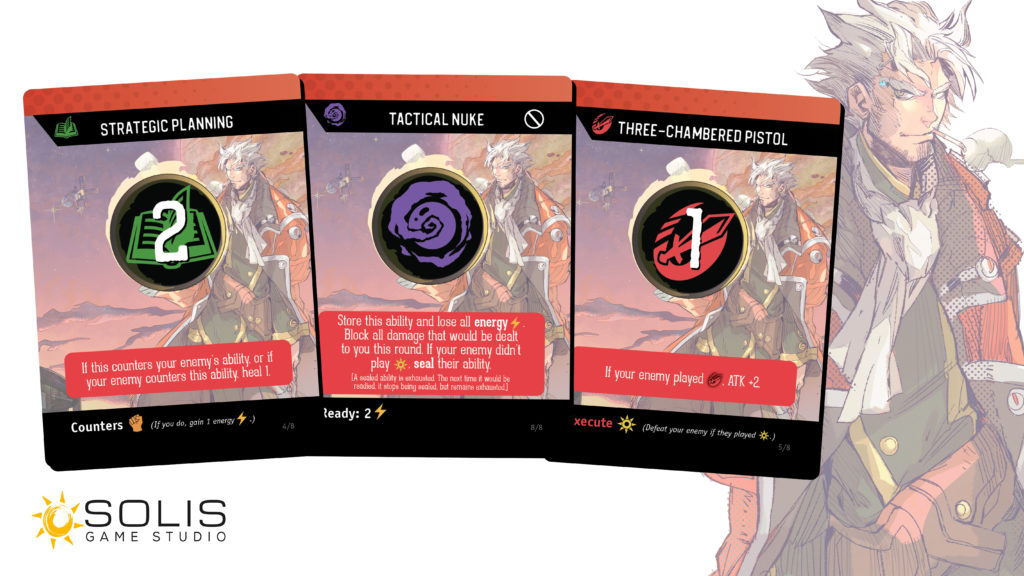
Each of the Space Lion characters uses Seal in different ways. Trey, the Distant Officer, uses it on his Tactical Nuke ultimate, which is the most powerful tool in the Leon Army’s arsenal. Trey has a plan for every situation, and his cards have extra effects when he counters his enemy or is countered himself. Even when he loses, Trey still finds a way to come out ahead. Trey’s name is a reference to game designer (and friend to Solis Game Studio) Trey Chambers, and his signature weapon the Three-Chambered Pistol is also an homage.
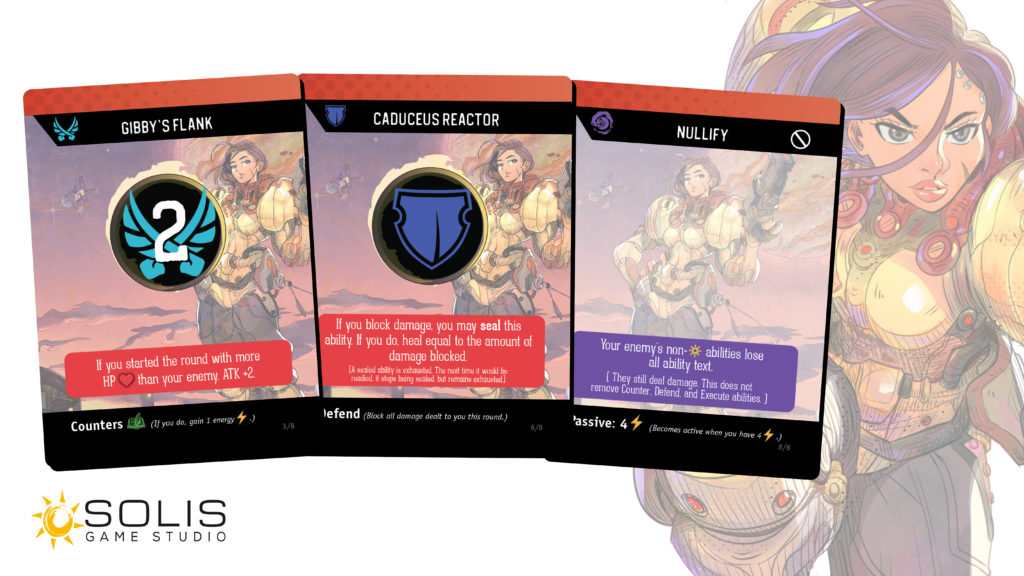
Samantha the Passionate War Hero is a combat medic, and her kit plays into both the “combat” and the “medic” sides of that. She can heal herself, not just as a way to stay alive, but as a means to power up her abilities that deal more damage if she’s at higher life. Her Caduceus Reactor allows it to seal itself against strong attacks to allow a huge swing in staying ahead of your enemy. Gibby’s Flank, a big payoff for having higher life, is also a reference to one of the other Leon army heroes, Gibby the Marine. Not all the important characters of Space Lion could end up being characters in Pocket Paragons, so I tried to work in references on some of the ability names in this way. Samantha’s ultimate, Nullify, recreates Yu-Gi-Oh’s Skill Drain, which is a favorite of Chris Solis, designer of Space Lion and founder of Solis Game Studio.
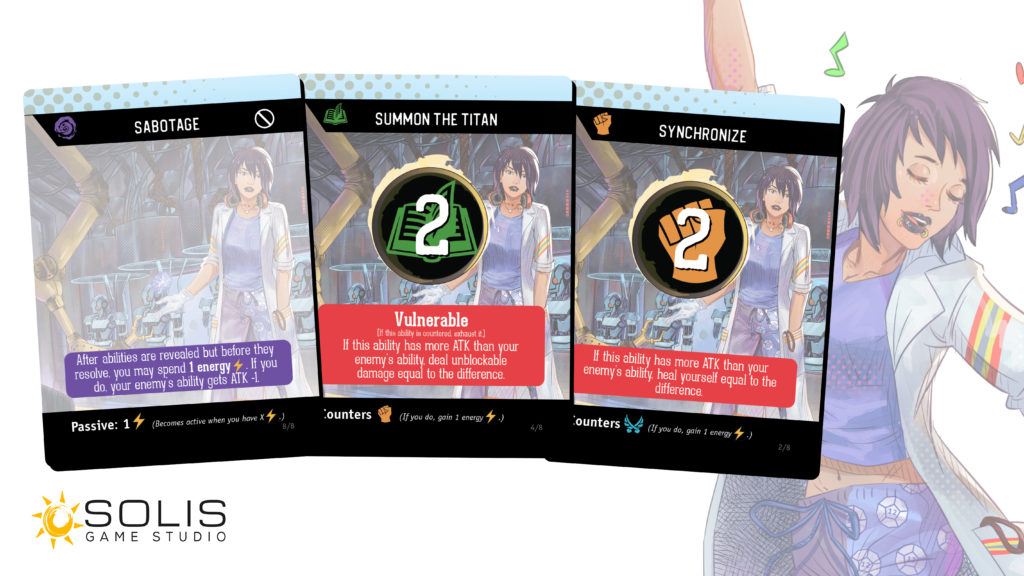
Malaya’s kit was based on an earlier version of her Space Lion counterpart that could reduce enemy attack power. Malaya reduces the attack of her enemy’s abilities with her Sabotage passive, and gets rewarded for having larger attack than her enemies. When it was changed in Space Lion, it was kept here as it was playing really well. She keeps the spirit of her army by allowing her to summon the Enerhiya’s strongest unit, the Titan. Even without comboing with her other card effects, you can use Sabotage to reduce the damage you take and turn off low-attack abilities with strong Hit effects.
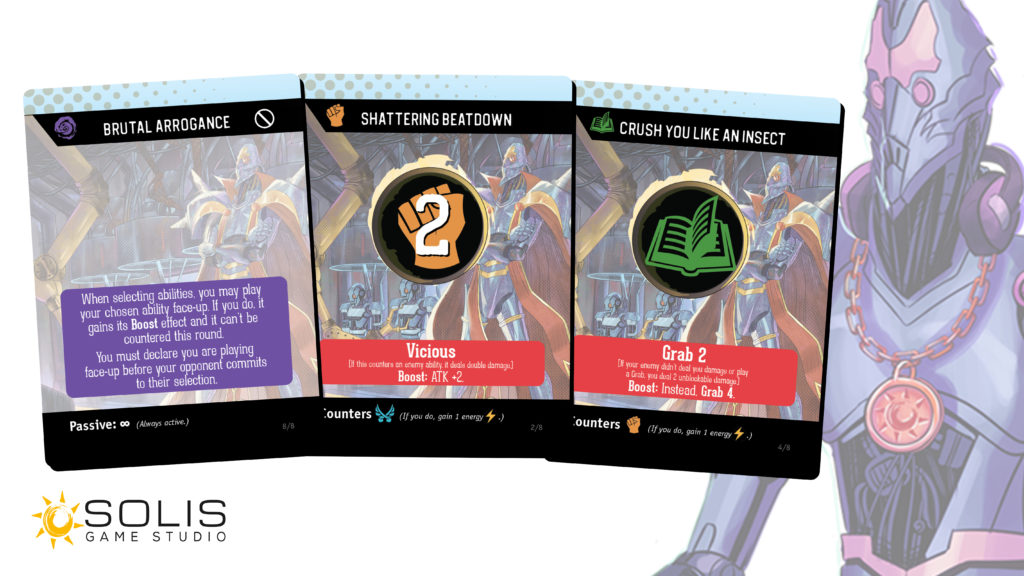
In an early version of Space Lion, Diyo was one of the only characters to be deployed face-up, daring you to come and challenge his power. That mechanic played so dynamically that it got expanded to other characters, and I wanted to bring some of that feeling to his kit in Pocket Paragons. His Brutal Arrogance passive allows you to play your cards face-up in order to add the Boost bonuses. The key to his design is to still give you reasons to want to play cards face-down sometimes, and face-up other times. Shattering Beatdown, for example, is 4 damage when boosted, but it can also sneak in 4 damage if played face-down and you catch them with the Vicious counter. Diyo also introduces the new Grab keyword, recreating a staple mechanic of fighting games that will be heavily featured in Pocket Paragons going forward. Grab allows you to punish defending enemies, rests, abilities you counter, and anyone taking a turn off to heal or do anything other than deal damage.
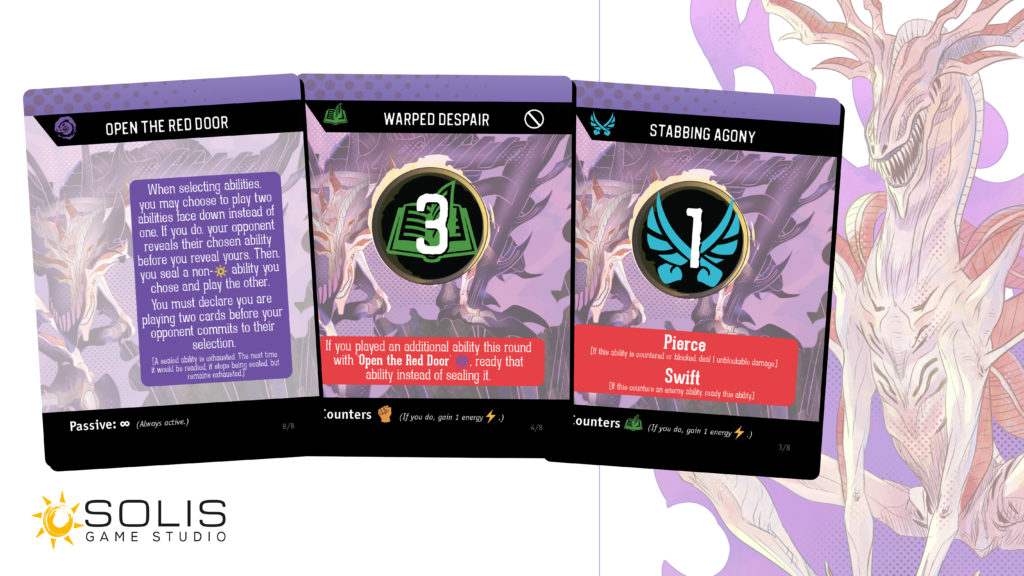
Proteus is our representative of the Vacuus army, and as my personal favorite Space Lion army, I absolutely had to capture their sneaky and tricky nature. Proteus can use their passive to play two cards and then choose which one they really wanted to play after they get to see their enemy’s choice. Using the seal mechanic as the drawback to keep that monumental power in check, you still get to unleash powerful counter effects like on Stabbing Agony, or mitigate the drawback with the powerful Warped Despair, but the simple strength of hiding your Rest works fantastically too. You have to be careful not to use it too much, as sealing the ability you didn’t play can add up over time, so try to use it more when you need to cover your options rather than every round.
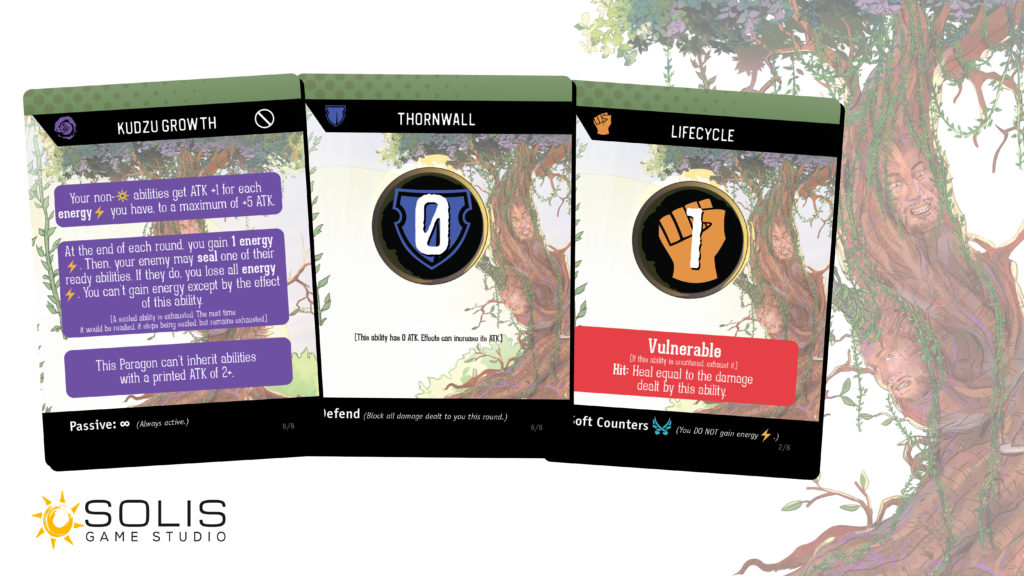
Jaryd and Alex bring the fast and powerful growth of the Kudzu army to Pocket Paragons. Thanks to their passive, all their attacks get more and more powerful each round, and your enemy must seal their cards to reset their progress. Their cards start off weak, but will grow out of control and use that power not just for damage (which is always great) but for other benefits, like Lifecycle’s healing. Jaryd and Alex can often be more complicated for the opponent to manage than the person playing them, as facing down that choice of when to seal every single round can be overwhelming. This character also marks the second time Jaryd has been referenced in Pocket Paragons– he’s also the designer of the puzzle game Solseris, Seris the Pyromancer’s namesake.
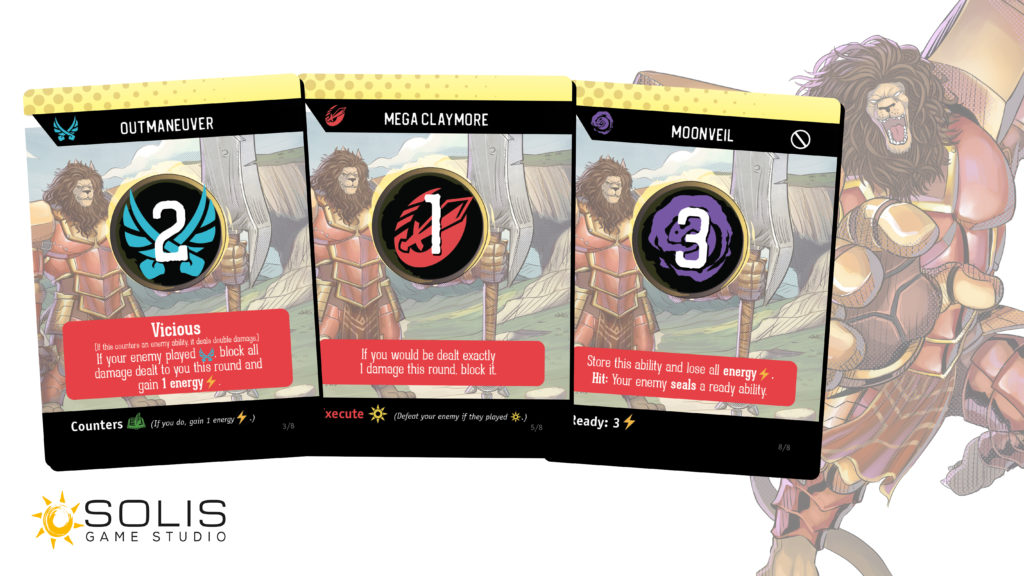
Aleksandr is here to represent the mighty Castell army, which gets to issue game-changing decrees when they tie their enemy in battle. Here, Aleksandr gets bonuses for matching the enemy’s symbols, blocking their damage and getting free energy to power up his Moonveil ultimate, which seals the enemy’s abilities and is an homage to a certain katana. Aleksandr’s damage is much lower than an average character, but because his abilities block one symbol and counter another, he’s often avoiding a lot of damage himself. His weapon also rewards you for tying against 1-damage attacks, which is very useful as a lot of powerful Hit effects can be found on 1 ATK abilities.
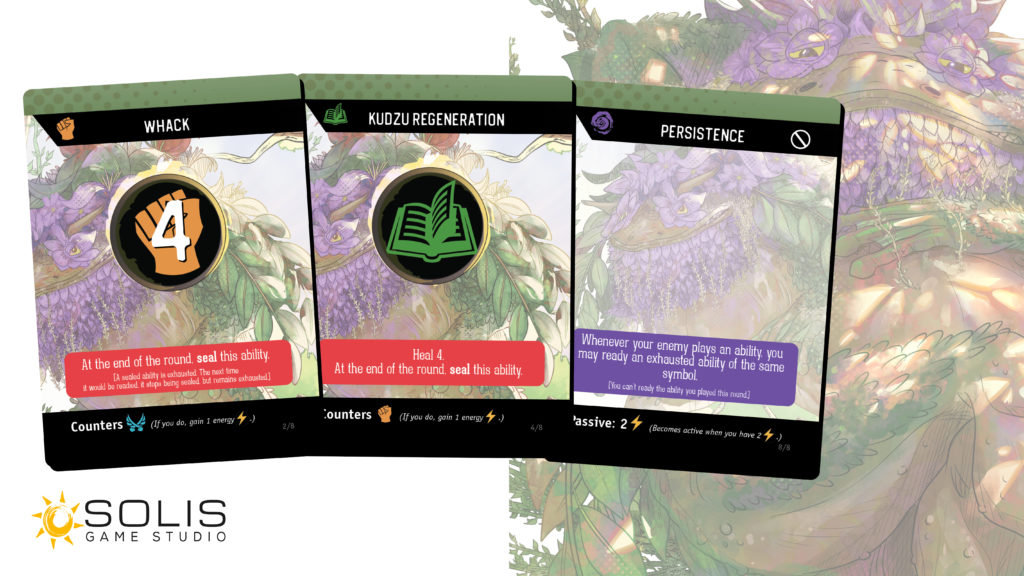
Last but certainly not least, Mr. Oops turns the seal mechanic on its head by having him seal his own abilities to offset their incredibly high power. Dealing 4 or healing 4 is nothing to scoff at, and you can offset the slow recovery period with his Persistence’s passive ability, allowing you to ready (or at least, unseal) your abilities. If you notice your opponent is being wary of letting you recover cards with your passive, use that knowledge to narrow down which cards they intend to play, giving you more opportunities to counter and execute them.
All 8 of these characters are available in the new Space Lion box of Pocket Paragons, so head over to our Kickstarter page and follow the campaign!